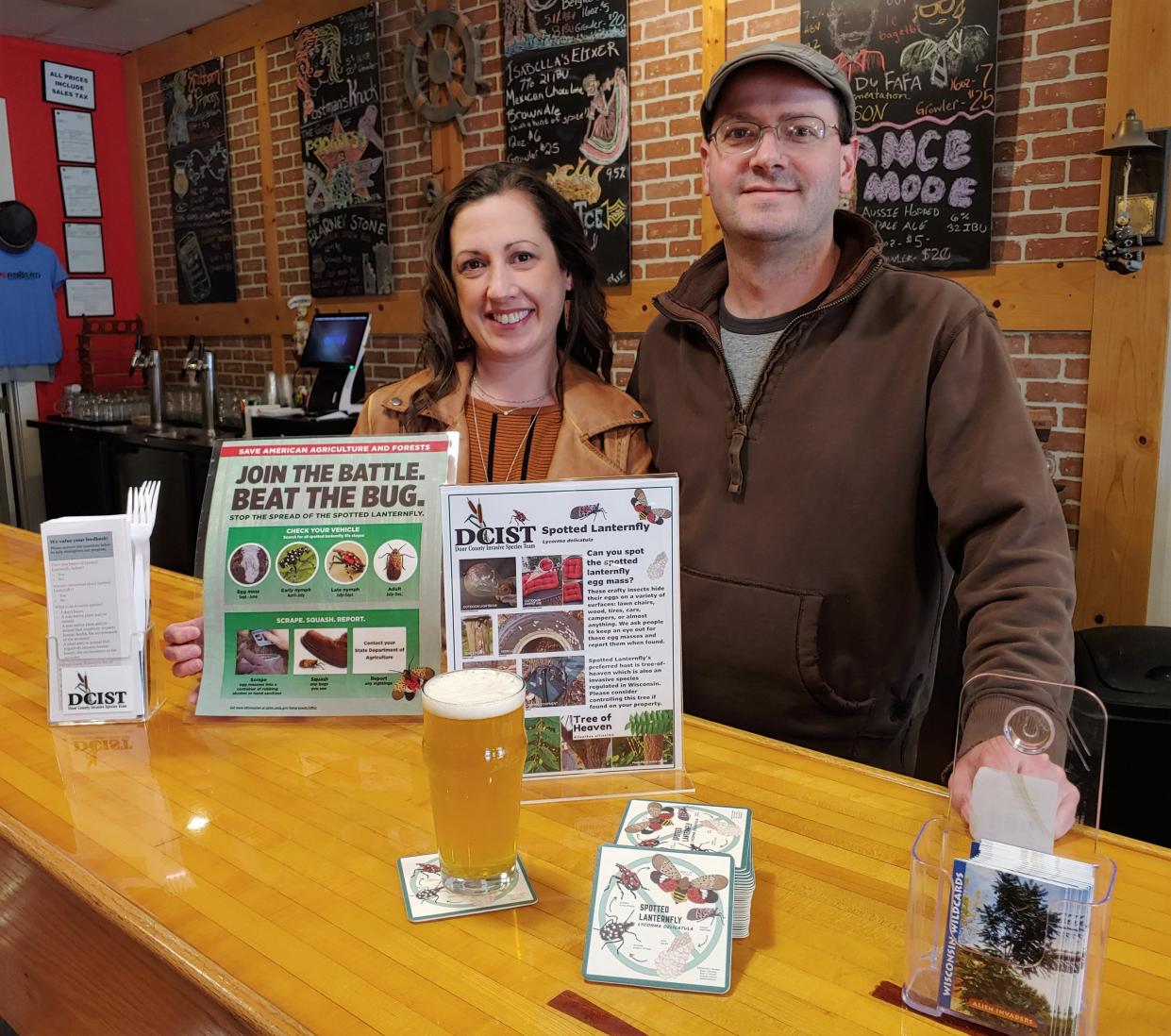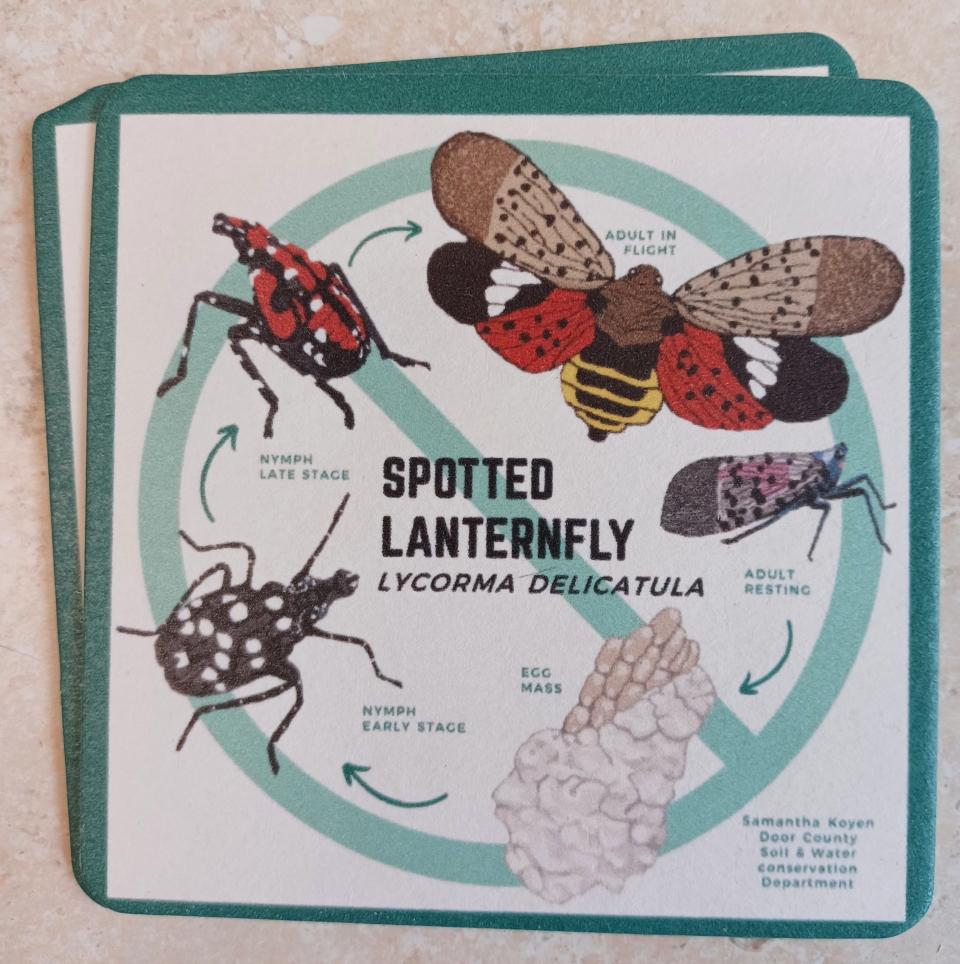Craft beer, invasive species come together in new Door County program

STURGEON BAY - Have a beer, learn about invasive species.
That's the idea behind a new outreach program the Door County Invasive Species Team (DCIST) is launching this week at Starboard Brewing Co.
The program will see the downtown Sturgeon Bay craft brewery and taproom serve a new beer, Planthopper Pale Ale, whose name is inspired by the spotted lanternfly, a nonnative insect that has been found in nearby states and potentially is especially destructive to plants used to make beer. The beer is expected to be tapped Wednesday but could be available this weekend, April 22 or 23, if the brewery has space for it in its taps.
Importantly, the beer will be served on coasters that feature illustrations of, and facts on, the lanternfly and ways to prevent the spread of invasive species. The taproom also will have materials such as information sheets and rack cards about the lanternfly and the spread of invasives.
And if this pilot effort succeeds, it might be seen at other Door County breweries in the future.
Here's what to know about the program, the invasive insect and, of course, the beer.
Bringing beer and invasives together
Samantha Koyen, DCIST coordinator, said she got the idea from a recent Upper Midwest Invasive Species Conference where she attended a seminar on what she called "brews and invasives."
It was about a partnership between the Pennsylvania Sea Grant, Penn State Behrend and Erie Brewing Co. in Pennsylvania to raise awareness of invasive aquatic species and water quality in the Great Lakes. The brewery started a four-beer Aquatic Invasive Species Draft Series, each spotlighting an invasive that is in neighboring Lake Erie with names like Round Goby Rye and Mystery Snail Ale.
Koyen said she was impressed with the idea and the impact the Pennsylvania program has made so far.
"They started off with a small program, and it's really taken off," Koyen said.
She also figured a similar idea could work quite well in Door County, with its natural beauty, parks, protected natural areas and outdoor recreation contributing heavily to its deep tourist economy, as well as a growing number of craft breweries on the Peninsula.
"I was thinking about the Door County community and how people, whether locals or tourists, talk about ecology," Koyen said. "And, what's more Wisconsin than a brewery?"
Koyen said Starboard Brewing was an easy choice to approach to be the first local brewery to take part in the effort. Starboard is a nanobrewery – it makes a variety of small batches of its beers with 12 styles on tap at a time, selling them in its taproom – so making a special beer for the program probably would make less of an impact on their regular operations, especially not yet knowing how well the program will go over.
"I don't want to put people's businesses in jeopardy," she said. "I want to make sure it works."
Also, Amanda Surfus, co-owner of Starboard with her husband, Patrick, is quite familiar with invasives on the Peninsula and their impact on the environment. She worked for the Door County Soil and Water Conservation Department, under which DCIST operates, for seven years and helped grow the DCIST program.
"I was excited they approached us to take part in this pilot program," Amanda said. "We're happy to help them get going."
Starboard has a history of making beers in conjunction with outreach conservation efforts in Door County. Those include a Honeysuckle Belgian Pale Ale it brewed with honeysuckle flowers in 2019 for the annual gathering of the Door County Land Trust and the Woolly Weiss, a Belgian white ale made in 2021 to honor the woolly mammoth sculpture that was placed in Bay View Park in Sturgeon Bay to commemorate the city's connection with the Ice Age National Scenic Trail.
"We think this could be a great thing, stir up some conversation," Amanda said about the DCIST program. "We're hoping that it's a good beer that'll start that conversation."
And, if you think that beer drinkers may not be all that conscientious about ecology, the Surfuses said that's not the case for craft beer fans in Door County, whether residents or visitors.
"The demographic we get is people who are out and about, hiking, talking about Land Trust properties, invasive species," Patrick said.
"I'm excited to hear the conversations that have happened," Amanda said about customers with who they've talked about the effort. "They were super excited."

Learning by coaster
Craft beer drinkers needn't worry that this program is an in-your-face educational push.
Participating breweries will make a beer with a name that reflects the invasive DCIST chooses to feature, with the style of the brew or its ingredients hopefully reflecting the selected species as well.
That beer, along with other beers, will be served by the brewery on coasters designed by Koyen that feature illustrations of the invasive in its various life stages on the front, as well as facts about it and things people can do to help stop the spread of invasives on the back.
Plus, the taproom will carry additional information customers can take with them about the featured species and what people can do to stop the spread of it and other invasives.
"This outreach effort is getting the message out to people. And it isn't forced learning," Koyen said. "It's meant to be more, 'Oh, I just learned something.'"
For this first effort, Starboard also will have feedback forms people can fill out so Koyen can shape the program to be informative and successful.
More than that, Koyen said she hopes the program makes people more aware of invasives besides the ones that will be featured by the beers, a concept the Surfuses echoed.
"We think this will shake up conversations about invasive species, not just the lanternfly," Amanda said. "There's constant change in the invasive species world. Just when you think you've got one handled, another one pops up. … And maybe people will discover invasives on their property that they didn't know were there before."
"It's about that kind of awareness," Patrick said, "that, hey, maybe that dame's rocket in my backyard isn't just a pretty purple wildflower."
Lanternfly: Bad for beer
As for the first featured invasive, the spotted lanternfly is a native of China and Vietnam that spread across Southeast Asia and was first found in the U.S. in 2014, in Pennsylvania. So far, it hasn't been detected in Wisconsin, but it has been in Indiana and Michigan.
This lanternfly looks like a large moth with spotted red and gray wings, but instead it is a planthopper, a group of insects related to leafhoppers and spittlebugs. It feeds by sucking the sap out of host plants, its preferred host being the tree-of-heaven, another invasive species.
But the spotted lanternfly will feed on more than 70 types of plant life ‒ including orchard and fruit trees such as apple, grape vines and plants such as hops, one of the vital ingredients in beer. They feed in swarms and have caused great damage to forests and crops, including grapes, across the eastern U.S., Koyen said.
"It's been found to have a really negative impact on orchards, trees, hops plants," Koyen said. "The implication on forestry is pretty significant."
Even though the lanternfly hasn't been detected in Wisconsin ‒ yet ‒ Koyen said its nearness to Wisconsin is a big reason it was chosen as the first featured invasive. Plus, the Surfuses noted the potential impact it could have on the local beer industry before it gets here.
"We think it's important to do one that isn't here yet so people can be aware of it," Amanda said.
"They've found prevention efforts work pretty well," Koyen said about stopping the lanternfly. "I thought it'd be a great species for a pilot program to remind people that they can make a difference."
So, what about the beer?
Since the lanternfly is a planthopper, the name Planthopper Pale Ale came readily to Patrick and Amanda, who like many other craft brewers enjoy giving their beers witty, clever or intriguing names.
Patrick Surfus said Planthopper is an easy-drinking, single-hop pale ale, not as herbal as an India pale ale or some other pale ales, so it can be enjoyed by a wide variety of beer drinkers, not just craft beer aficionados.
Starboard brewed one barrel of Planthopper, and Patrick said he expects it'll last about two to three weeks. Once it's gone, it's gone, unless Patrick decides to revisit the recipe in the future.
DCIST plans to work with Starboard on a follow-up beer, likely this summer, featuring a species to be determined. Amanda said a beer featuring an aquatic invasive would be of interest for them this summer, given the importance of fishing, boating and water recreation to Door County and the number of visitors taking part in those activities during the tourist season.
"It will be great working with DCIST while invasives are out there and visible," she said.
And, again, if these first invasive-themed beers are popular with customers, get people talking about invasives, and making them isn't too much trouble for Starboard, Koyen hopes to get other craft brewers on the Peninsula involved down the road. The Surfurs look forward to continuing to be part of the program.
"We think this could be a great thing, stir up some conversation," Amanda said. "We're hoping that it's a good beer that'll start that conversation."
FYI
The new Planthopper Pale Ale, part of an outreach program with the Door County Invasive Species Team, will be tapped either this weekend or Wednesday at Starboard Brewing Co., 151 N. Third Ave., Sturgeon Bay. The special craft beer is expected to be available for two to three weeks; check with the brewery for availability. Regular hours are from 3 to 8 p.m. Wednesdays and Thursdays, noon to 9 p.m. Fridays and Saturdays, and noon to 6 p.m. Sundays. For more information, call 920-818-1062 or visit facebook.com/starboardbrewing.
For more about DCIST, visit doorinvasives.org.
Contact Christopher Clough at 920-562-8900 or cclough@doorcountyadvocate.com.
MORE: Small businesses thrive in Door County, study says
MORE: Door Shakespeare theater company names new managing director
FOR MORE DOOR COUNTY NEWS: Check out our website
This article originally appeared on Green Bay Press-Gazette: Craft beer, invasive species come together in new Door County program

